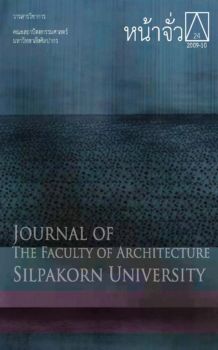ภูมิปัญญาและแนวคิดเศรษฐกิจพอเพียงของสถาปัตยกรรมในอุตสาหกรรมเกษตรพื้นบ้านบริเวณลุ่มนํ้าเพชรบุรี
Keywords:
สถาปัตยกรรมพื้นถิ่น, อุตสาหกรรมพื้นบ้าน, ภูมิปัญญา, เศรษฐกิจพอเพียง, นิเวศวัฒนธรรม, vernacular architecture, cottage industry, local wisdom, sufficient economy, cultural ecologyAbstract
สถาปัตยกรรมและเครื่องมือเครื่องใช้เพื่อรองรับกิจกรรมที่เกี่ยวเนื่องกับอุตสาหกรรมพื้นบ้านมีพัฒนาการควบคู่กับสังคมเกษตรมาเป็นเวลาเนิ่นนาน และมักมีความแตกต่างกันไปตามเงื่อนไขของท้องถิ่น ลุ่มนํ้าเพชรบุรีจัดได้ว่าเป็นพื้นที่ที่มีความหลากหลายทางระบบนิเวศน์ ผลิตผลทางการเกษตร และกลุม่ ชาติพันธุ ์ อันนำมาซึ่งความหลากหลายในการพัฒนารูปแบบของอุตสาหกรรมเกษตรพื้นบ้าน สถาปัตยกรรม และอุปกรณ์ที่ใช้ประกอบการผลิตต่างๆที่มีความเฉพาะตามไปด้วย อย่างไรก็ตามท่ามกลางสภาวะการเปลี่ยนแปลงทางสภาพแวดล้อม สังคมและเศรษฐกิจชาวบ้านในพื้นที่ลุ่มน้ำเพชรบุรีก็ไม่สามารถหลีกเลี่ยงผลกระทบได้ และอาจทำให้ต้องมีการปรับตัว ทั้งกระบวนการผลิต และสิ่งแวดล้อมสรรค์สร้างที่เกี่ยวเนื่องอีกด้วย บทความนี้มีวัตถุประสงค์เพื่อนำเสนอเรื่องราวภูมิปัญญาและแนวคิดเศรษฐกิจพอเพียงในพัฒนาการของสถาปัตยกรรม เครื่องมือเครื่องใช้ และกิจกรรมการผลิตของผู้ประกอบการในอุตสาหกรรมเกษตรพื้นบ้านที่สัมพันธ์กับระบบนิเวศและปัจจัยอื่นๆ ที่เกี่ยวข้อง บริเวณลุ่มนํ้าเพชรบุรี ข้อมูลที่ใช้ในบทความนี้มาจากการศึกษาในพื้นที่ 3 อำเภอ คือ คือ อำเภอท่ายาง อำเภอบ้านลาด และอำเภอบ้านแหลม โดยมีกรณีศึกษาตามประเภทกิจกรรมทางการเกษตรที่สัมพันธ์กับนิเวศแวดล้อม ได้แก่ นาข้าว นาเกลือ พืชไร่ พืชสวน การประมงทะเลชายฝั่ง และการปศุสัตว์ ข้อมูลที่ได้ถูกวิเคราะห์และอภิปรายผ่านการจัดหมวดหมู่อย่างเป็นระบบและการเทียบวิเคราะห์ จากการศึกษาพบว่าสถาปัตยกรรมพื้นถิ่นและเครื่องมือเครื่องใช้อันเกี่ยวเนื่องกับอุตสาหกรรมการเกษตรมีความหลากหลายและสอดคล้องไปกับกิจกรรมการผลิตที่สัมพันธ์กับระบบนิเวศลุ่มนํ้าเพชรบุรี บางส่วนมีแนวโน้มที่กำลังจะสูญหายไปในอนาคต และบางส่วนมีพัฒนาการอย่างต่อเนื่องโดยมักมีการใช้วัสดุสมัยใหม่หรืออุปกรณ์และเครื่องมือประกอบการผลิตที่มีเทคโนโลยีขั้นสูงมากขึ้น ซึ่งการพัฒนาการต่างๆ มีผลต่อการเปลี่ยนแปลงอัตลักษณ์ของท้องถิ่นอีกด้วย ถึงแม้ว่าการพัฒนาของสถาปัตยกรรมพื้นถิ่นเพื่อตอบสนองการผลิตของอุตสาหกรรมเกษตรพื้นบ้านในภาพรวมจะมีแนวโน้มความสัมพันธ์ที่ห่างเหินจากแม่นํ้าเพชรบุรี จากการวิเคราะห์ พบว่า สิ่งแวดล้อมสรรค์สร้างพื้นถิ่นในพื้นที่ศึกษาสะท้อนให้เห็นถึงภูมิปัญญาและแนวคิดเศรษฐกิจพอเพียงใน 2 แง่มุม คือ 1) สถาปัตยกรรมโรงเรือนและอุปกรณ์การผลิตที่สะท้อนให้เห็นถึงข้อคิดในการประหยัดพลังงาน สุนทรียภาพแห่งการผสมผสานของหลายประโยชน์ใช้สอย และโครงสร้างอาคารที่ให้ผลประโยชน์ในเชิงเศรษฐกิจ และ 2) วิถีการดำเนินกิจการที่มีทั้งด้านการอนุรักษ์ทรัพยากรธรรมชาติ ด้านการสร้างการผลิตที่หลากหลาย และด้านการสร้างระบบพึ่งพาและรวมกลุ่มการผลิตของชุมชน ทั้งนี้เพื่อเป็นภูมิคุ้มกันให้ตนเองท่ามกลางสภาวะทางสังคมและเศรษฐกิจที่ผันแปรอย่างต่อเนื่อง
Intellect and Concepts of Sufficient-economy in Architecture for Agriculture-cottage Industry in Phetchaburi Basin
Wandee Pinijvarasin, Pega Sanounmeung, Kanyapa Aramrak and Spawit Danthamrongkul
Faculty of Architecture, Kasetsart University
Vernacular architecture and tools for cottage industry have long been developed in agriculture society. They are different from place to place in accordance with the conditions of a particular locality. Phetchaburi basin contains a variety of ecological systems, agricultural products and ethnic groups, thus bringing about various types of agriculture-cottage industry. Various types of architecture and tools for those production activities are needed. However, with changing conditions
of the environment, social and economic, the residents along Phetchaburi basin cannot avoid those changes, and perhaps must adjust the ways to produce their agricultural products, building, and tools accordingly. This paper aims to explore intellect and concepts of sufficient economic in the development of architecture, tools, and production activities of the residents in the agriculture-cottage industry in Phetchaburi basin.
The study was conducted by examining vernacular architecture for agriculture-cottage industry in the districts of Ta-Yang, Ban-Lad and Ban-Lham. Case studies were selected in accordance with agricultural activities and ecology, which were agricultural fields, salt fields, farm and garden plants, coastal fishery, and livestock. The data obtained were analyzed and discussed by systemic taxonomy and cross-case analysis.
The study reveals that vernacular architecture and tools for agriculturecottage industry along Phetchaburi basin were various and appeared in accordance with production activities and its ecology. Some of them seemed to be disappearing.
Some were developed, and often founded with the use of modern machines and high technology. This, somehow, has influenced changes to the locality identity. Even though the development of architecture for agriculture-cottage industry seemed generally to eliminate its relationship with Phetchaburi River, they reflected on local intellect and ideas on sufficient economic in two aspects. First, buildings and tools suggested an approach for energy conservation, aesthetics of mixed uses, and the building structure providing benefits to the owner. Second, the activities in agriculture-cottage industry of the local residents suggested their ways to conserve the natural resources, their creations to operate various production activities at the same time, and their mutual dependennce on each other within the community. Also, community cooperation became an important approach to protect their agriculture-cottage industry within changing conditions of social and economic.





